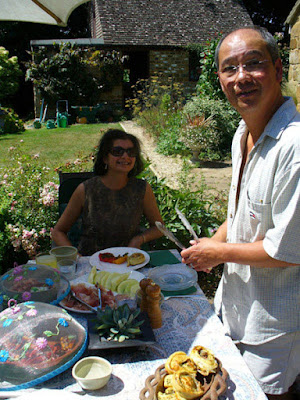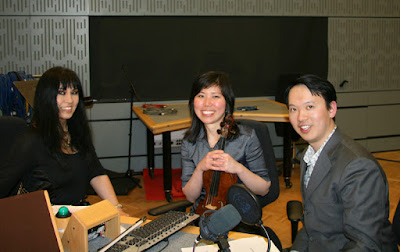Anna Chen presents the groundbreaking ten-part series Chinese in Britain made for BBC Radio 4 broadcast in 2007, repeated from 27th October 2014 on R4 Extra.
(Recorded 2006 and 2007)
Anna and the late Harry Dewar (Cheong) at the BBC launch of the ten-part series for Radio 4, Chinese In Britain
This seminal work on the Chinese diaspora was presented by Anna Chen and produced by Mukti Jain Campion of Culture Wise for BBC Radio 4.
The series Chinese In Britain brought into view many overlooked aspects of the cultural and social impact of the Chinese in Britain for the first time, including introducing BBC audiences to the first documented Chinese visitor to Britain: Jesuit priest Michael Shen Futsong who impressed King James II enough for the king to have his portrait painted and hung in his bedroom.
Its fascinating range of contributors ranged from the catering giant and philanthropist Wing Yip to the lesser known characters who have lived here and made their mark. Artists such as the late Pam So whose grandmother walked all the way across Europe from China; Yvonne Foley whose Chinese seafaring father was was one of hundreds forcibly repatriated to China after World War II having served Britain in the merchant navy and risked their lives; actors such as Jacqueline Chan, David Yip (The Chinese Detective) and the venerable Burt Kwouk; masterchef and Bafta film editor Dehta Hsiung, whose playwright father Shi I Hsiung had a massive hit on the West End Stage in the 1930s with Lady Precious Stream; Leslie and Connie Ho who were born into Limehouse Chinatown — actually two streets, Limehouse Causeway and Pennyfields.
We looked at the myth of Chinatown and how it was created, and the yellow peril fears that made a career for Brummie hack Sax Rohmer (Arthur Henry Ward) with his villainous creation, Dr Fu Manchu. While Fu Manchu was a fictional student at Edinburgh, the series provided a rare glimpse into the lives of the early Chinese medical students who actually did study there and who contributed to the British way of life, rather than the commonplace racist sensationalism preferred by dimmer media peeps with an eye on showbiz.
Other interviewees included the late Harry Dewar, Dr Diana Yeh, Professor Gregor Benton, Olga Adderton, Dr David Helliwell, Dr John Seed, Professor Michael Fisher, Graham Chan, Dr Ian Wotherspoon, Ying Chinnery, Lee Cheong, Rosa Fong, Grace Lau and Connie and Leslie Ho (above). Not forgetting the late Jessie Lim who wrote and came up with the idea for the series' creation. (Jessie was the mother of several key projects including the anthology of Chinese British writing, Another Province.)
And now, for the benefit of those who missed it first time around and fancy playing catch-up, it's back daily from Monday 27th October 2014 on BBC Radio 4 Extra at 00:15 and 14:15.
Making the series, Chinese In Britain.
Recording the history of Chinese in Britain, a ten-part 15 minute series for BBC Radio 4, for transmission at 3:45pm weekday afternoons over two weeks from Monday 30th April 2007.
Chinese In Britain was a landmark series in an impressive body of radio work produced by Mukti Jain Campion at Culture Wise. In January 2007, on the first day of the big storms, Mukti and Anna went to Liverpool to record more stories for the series.
Anna at the Chinese Seamen's memorial plaque, Pier Head, by a stormy Mersey.
Anna in Liverpool's Chinatown at the site of the old Arthur Holt/Blue Funnel offices in Nelson Street whose steamships brought Chinese to Britain from the late 19th century to the 1960s and 70s.
In Pitt Street where Anna's father used to live before World War II when the Lutwaffe flattened it.
Anna and Professor Michael Fisher at Shadwell Church near Limehouse in east London to see John Anthony's home ground. John Anthony was a Chinese seaman and then an agent looking after Chinese sailors for the East India Shipping Company in the late 18th, early 19th century. He was the first Chinese to be naturalised as a British citizen in 1805.
The lovely Burt Kwouk and Anna. Burt has acted in many films including The Inn of the Sixth Happiness and The Pink Panther, where he played Inspector Clouseau's sidekick Kato. He can now be seen in the TV series, Last of the Summer Wine. 26th July 2006
Anna and actor David Yip at his home. The 1980s TV series, The Chinese Detective, turned David into a household name.
SERIES EPISODES
Anna in Liverpool's Chinatown at the site of the old Arthur Holt/Blue Funnel offices in Nelson Street whose steamships brought Chinese to Britain from the late 19th century to the 1960s and 70s.
In Pitt Street where Anna's father used to live before World War II when the Lutwaffe flattened it.
Anna and Professor Michael Fisher at Shadwell Church near Limehouse in east London to see John Anthony's home ground. John Anthony was a Chinese seaman and then an agent looking after Chinese sailors for the East India Shipping Company in the late 18th, early 19th century. He was the first Chinese to be naturalised as a British citizen in 1805.
Burt Kwouk in Inn of the Sixth Happiness
The lovely Burt Kwouk and Anna. Burt has acted in many films including The Inn of the Sixth Happiness and The Pink Panther, where he played Inspector Clouseau's sidekick Kato. He can now be seen in the TV series, Last of the Summer Wine. 26th July 2006
Anna and actor David Yip at his home. The 1980s TV series, The Chinese Detective, turned David into a household name.
17th August 2006
Lunch with producer Mukti Jain Campion at David Yip's.
Actor David Yip at home.
With Yvonne Foley who deep dived into a forensic investigation on finding out what happened to her father. Like hundreds of other Chinese seamen, who worked on British merchant ships throughout the Second World War, Yvonne believes he was forcibly repatriated by his shipping company (in collusion with the British Government) as soon as the war was over. She also uncovered some material about Anna's own father who helped set up the Chinese Seaman's Union and Kungho Mutual Aid Association for Chinese living in Britain. 27th July 2006
The series introduced Jesuit Priest Michael Shen Futsong to BBC audiences as the first documented Chinese in Britain (thanks to Mukti's illuminating excavations). A favourite of King James II, his portrait hangs in the Queen's collection. He helped catalogue the Chinese books in the Bodleian collection while he was on his world tour of Europe in the late 17th century.
SERIES EPISODES
1) VIPs including the first documented Chinese in Britain, Jesuit priest Michel Shen Futsong who Dr David Helliwell describes at Oxford. Professor Michael Fisher talks about John Anthony, the first naturalised Chinese Briton around the turn of the 19th century.
2) Chinatown. The myth of Chinatown, Sax Rohmer, Fu Manchu and the Yellow Peril, and the reality of Limehouse with Connie and Leslie Ho who were born and raised in London's Chinese Limehouse community until the Blitz. Dr John Seed.
3) Ship to Shore. UK ports as centres of Chinese migration to the UK, the role played by Chinese in World War II, and their forced repatriation by the Atlee government after the war. Graham Chan, Yvonne Foley and Professor Gregor Benton.
4) Steam and Starch. Laundries: the iconic industry that gave so many Chinese in Britain a living until the advent of the domestic washing machine. Olga Adderton.
5) Educated in Britain. Students have studied here since the first Chinese medical students in Edinburgh. Dr Ian Wotherspoon.
6) Feet Unbound. The earliest Chinese women in Britain. The fascinating story of the women performers who walked from Hubei in China despite having bound feet. Grace Lau's mother was the wife of a diplomat and so arrived in more stylish fashion in the 1930s. Pamela So, Professor Gregor Benton, Grace Lau.
7) Mixed Blessings. Eurasians. With so few Chinese women in Britain, Chinese seamen often took on white wives, many of the Irish. Yvonne Foley is herself mixed Chinese and British. Her father was a Chinese seaman who was forcibly repatriated from their Liverpool home. Leslie and Connie Ho, who were born and raised in London's Limehouse, say they were better fed than their white counterparts because many white men drank. Lee Cheung of Limehouse welcomed the return of his father from voyage, laden with rare exotic presents such as Jaffa oranges. Actor David Yip was born in Liverpool whose Chinese seaman father was also absent for long parents. Mixed Chinese and black evacuees weren't welcome in Chester and had to walk home. Harry Cheong/Dewar was rejected by the army when he signed up for the Second World War until China joined the allied side.
8) Artistic pursuits. Shi I Hsiung was the first successful playwright and theatre director with his West End hit of the 1930s, Lady Precious Stream. Lauded by George Bernard Shaw, H G Wells and a raft of luminaries, he and his wife were the toast of the town. His son, the masterchef Dehta Hsiung, is interviewed, along with photographer Grace Lau and Dr Diana Yeh.
9) Screen Beginnings. David Yip, Burt Kwouk, Jacqueline Chan and Grace Lau talk about The Inn of the Sixth Happiness, starring Ingrid Bergman as Gladys Aylward, Robert Donat as the Mandarin and Curt Jurgens as General Lin and shot in Snowdonia. Made in 1958, it was a breakthrough for many of our best known Chinese actors, such as Tsai Chin.
10) Takeway. With Wing Yip who started out as a waiter in Hull before founding his food empire.
Series music by Chi2. Intro voice David Tse.
“A fascinating story” - Chris Campling, The Times
“Each episode sounded effortless only because it had been crafted with such supreme care” - Gillian Reynolds, The Daily Telegraph
LISTEN AGAIN FROM SUNDAY NIGHT, QUARTER PAST MIDNIGHT: daily from Monday 27th October 2014 on BBC Radio 4 Extra at 00:15 and 14:15.
LAUNCH PARTY at BBC Broadcasting House.
Edit 2nd August 2022: Yvonne Foley's campaign succeeds in winning today's Home Office acknowledgment of the secret forced expulsion of the Chinese seamen who'd aided Britain during World War II and settled in Liverpool.

























 Marlene Dietrich, Anna May Wong and Leni Riefenstahl
Marlene Dietrich, Anna May Wong and Leni Riefenstahl